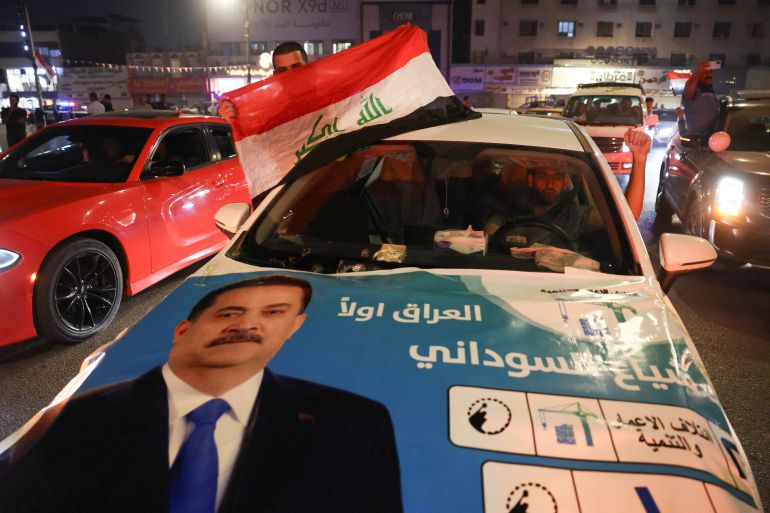Iraqi PM al-Sudani’s coalition comes first in parliamentary election
With no clear majority, formation of next government will require intensive deal-making among strongest blocs.

Published On 12 Nov 202512 Nov 2025
Save
A coalition led by Iraqi Prime Minister Mohammed Shia al-Sudani has emerged as winner in Iraq’s parliamentary election, according to electoral authorities.
The Independent High Electoral Commission said on Wednesday that al-Sudani’s Reconstruction and Change coalition received 1.3 million votes in Tuesday’s election, about 370,000 more than the next closest competitor.
Recommended Stories
list of 3 itemsend of list
Speaking after the initial results were announced, al-Sudani hailed the voter turnout of 56 percent, saying it was “clear evidence of another success” that reflected the “restoration of confidence in the political system”.
However, while al-Sudani, who first came to power in 2022, had cast himself as a leader who could turn around Iraq’s fortunes after decades of instability, the poll was marked by disillusionment among weary voters who saw it as a vehicle for established parties to divide Iraq’s oil wealth.
Turnout was lower in areas like Baghdad and Najaf after populist Shia leader Muqtada al-Sadr, leader of the Sadrist Movement, called on his vast numbers of supporters to boycott the “flawed election”.
As expected, Shia candidates won seats in Shia-majority provinces, while Sunni candidates secured victories in Sunni-majority provinces and Kurdish candidates prevailed in Kurdish-majority provinces.
But there were some surprises, notably in Nineveh, a predominantly Sunni Arab province, where the Kurdistan Democratic Party (KDP) secured the highest number of seats.
Meanwhile, in Diyala province, which has a significant Kurdish minority, no Kurdish candidates won seats for the first time since 2005.
Advertisement
No party can form a government on its own in Iraq’s 329-member legislature, so parties build alliances with other groups to become an administration, a fraught process that often takes many months.
Back in 2021, al-Sadr secured the largest bloc before withdrawing from parliament following a dispute with Shia parties that refused to support his bid to form a government.
“None of the political factions or movements over the past 20 years have been able to gain a total majority … that allows one bloc to choose a prime minister, so at the end, this is going to lead to rounds of negotiations and bargaining among political factions,” said Al Jazeera’s Ali Hashem, reporting from Baghdad.
The poll marked the sixth election held in Iraq since a United States-led invasion in 2003 toppled longtime ruler Saddam Hussein and unleashed a sectarian civil war, the emergence of the ISIL (ISIS) group and the general collapse of infrastructure in the country.
The next premier must answer to Iraqis seeking jobs and improved education and health systems in a country plagued by corruption and mismanagement.
He will also have to maintain the delicate balance between Iraq’s allies, Iran and the US, a task made all the more delicate by recent seismic changes in the Middle East.

